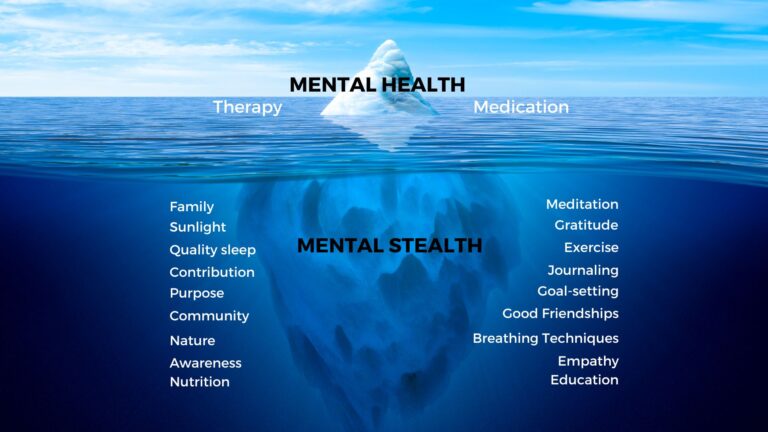Mental Stealth
By Nick Kenny, KYDS Facilitator & Partnership Manager

Have you ever felt like the messaging around mental health was lost on young people? Research shows that despite 75%
of mental health problems beginning before the age of 25, only 31% of young women and 13% of young men who are struggling are likely to access professional help[i].
On top of this, existing services are under a huge amount of pressure. While the federal government may have announced an
extra $2.3 billion to be spent on mental health last year, only 15% of this was dedicated to youth mental health services, and less than 5% for prevention measures such as parenting education & support, and child mental health & well-being hubs[ii].
In addition to conventional ideas, such as counselling and medication, we need to introduce what I call “mental stealth”. What does this mean? “Mental stealth” refers to the quiet habits that make a huge difference in our well-being. It means introducing these habits early in life to give young people the strongest foundation possible to thrive. It means tools for people who may be struggling but either can’t or won’t access professional help, or extra help for people who are seeing a professional already, and would like to be more proactive. Really, it’s for anyone who wants to live a better life. Who doesn’t want that?
Our school already has counselling staff and overall well-being levels are strong. Why do we need this?
Research has shown that it is neither sufficient nor realistic to leave promotion and prevention in mental health entirely up to mental health professionals[iii]. On top of this, evidence clearly shows that even in healthy individuals, those who have greater levels of subjective well-being are physically healthier, more academically successful, and have better relationships[iv].
What does “mental stealth” look like?
Take your pick. Journaling, exercise, meditation, acts of kindness, gratitude practices, goal-setting, connecting with nature, yoga, artwork, breathing exercises, intentional connection with friends & family, or all of the above (or none of the above if something better works for you).

Who plays a role?
Everyone. For parents, this could mean showing your child or teen the huge benefits of what these small habits can do and
how they can get started (note the emphasis on “showing” rather than “telling” – they will be much more likely to be on board if you model this behaviour yourself). For educators, this could mean introducing these in the classroom setting, establishing new well-being groups or growing existing ones, or introducing this into the PDHPE curriculum. And for students, this is an opportunity to take the lead and help your peers become masters of their own well-being.
How do I get started?
A few things to remember. Firstly, start small. Any new habit should only take a few minutes each day at first[v]. Secondly, be consistent – long-term consistency beats short-term intensity. And finally, be patient. We know that reading a chapter of a textbook one night isn’t going to be enough to pass an exam, but if we put in a bit of work on a regular basis, then over time the benefits pay off.
For more tips on how to improve your life and the lives of those around you with “mental stealth”, follow us on social media.
——————————————
[i] Slade T, Johnston A, Teesson M, Whiteford H, Burgess P, Pirkis J, et al. (2009) The Mental Health of Australians 2: Report on the 2007
National Survey of Mental Health and Wellbeing. (Canberra: Department of Health and Ageing).
[ii] Mental Health Australia. 2021 Federal Budget Summary. 11th May.
https://mhaustralia.org/sites/default/files/docs/2021_federal_budget_summary_final.pdf
[iii] Colizzi, M., Lasalvia, A. & Ruggeri, M. (2020). Prevention and early intervention in youth mental health: is it time for a multidisciplinary and trans-diagnostic model for care? International Journal of Mental Health Systems, 14. Article 23. https://ijmhs.biomedcentral.com/articles/10.1186/s13033-020-00356-9
[iv] Achor, S. (2010). The happiness advantage: The seven principles that fuel success and performance at work. Virgin Publishing
[v] Clear, J. (2018). Atomic Habits: An easy and proven way to build good habits and break bad ones. Century-Trade.